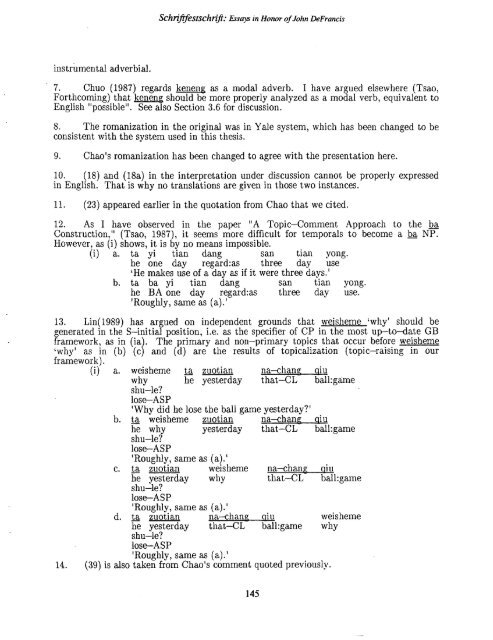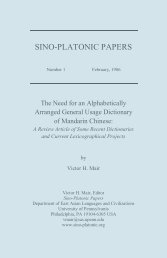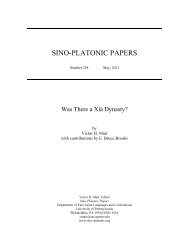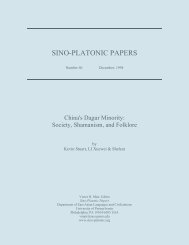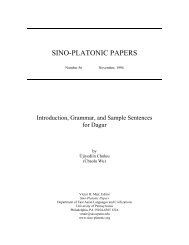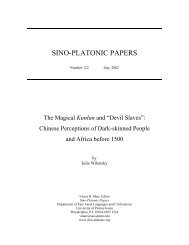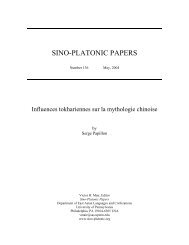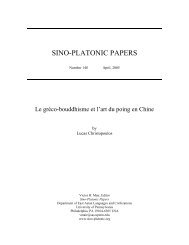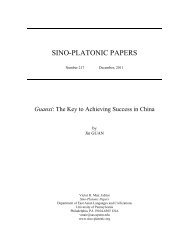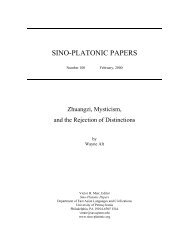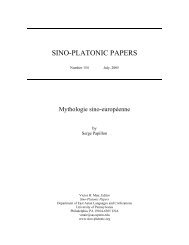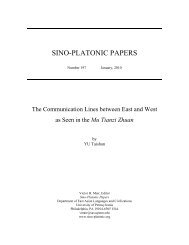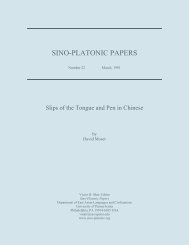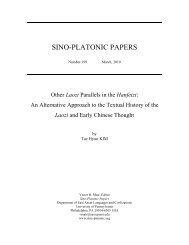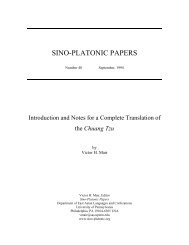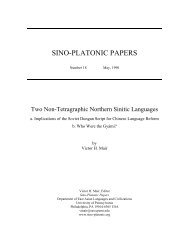Essays on Writing and Language in Honor - Sino-Platonic Papers
Essays on Writing and Language in Honor - Sino-Platonic Papers
Essays on Writing and Language in Honor - Sino-Platonic Papers
Create successful ePaper yourself
Turn your PDF publications into a flip-book with our unique Google optimized e-Paper software.
<strong>in</strong>strumental adverbial.<br />
SchnfrfestschriJi: Essq <strong>in</strong> H<strong>on</strong>or of John DeFrancis<br />
7. Chuo (1987) regards keneng as a modal adverb. I have argued elsewhere (Tsao,<br />
Forthcom<strong>in</strong>g) that kenene should be more properly analyzed as a modal verb, equivalent to<br />
English I' possi ble" . See also Secti<strong>on</strong> 3.6 for discussi<strong>on</strong>.<br />
8. The romanizati<strong>on</strong> <strong>in</strong> the orig<strong>in</strong>al was <strong>in</strong> Yale system, which has beell changed to be<br />
c<strong>on</strong>sistent with the system used <strong>in</strong> this thesis.<br />
9. Chao's romanizati<strong>on</strong> has been changed to agree with the presentati<strong>on</strong> here.<br />
10. (18) <strong>and</strong> (18a) <strong>in</strong> the <strong>in</strong>terpretati<strong>on</strong> under discussi<strong>on</strong> cannot be properly expressed<br />
<strong>in</strong> English. That is why no translati<strong>on</strong>s are given <strong>in</strong> those two <strong>in</strong>stances.<br />
11. (23) appeared earlier <strong>in</strong> the quotati<strong>on</strong> from Chao that we cited.<br />
12. As I have observed <strong>in</strong> the paper "A Topic-Comment Approach to the<br />
C<strong>on</strong>structi<strong>on</strong>," (Tsao, 1987)) it seems more difficult for temporals to become a & NP.<br />
However, as (i) shows, it is by no means impossible.<br />
(i) a. ta yi tian dang san tiail y<strong>on</strong>g.<br />
he <strong>on</strong>e day regard:as three day use<br />
'He makes use of a day as if it were three days.'<br />
b. ta ba yi tian dang san tian y<strong>on</strong>g.<br />
he BA <strong>on</strong>e day regard:as three day use.<br />
'Roughly, same as (a).'<br />
13. L<strong>in</strong>(1989) has argued <strong>on</strong> <strong>in</strong>dependent grounds that weisheme 'why' should be<br />
generated <strong>in</strong> the S-<strong>in</strong>itial positi<strong>on</strong>, i.e. as the specifier of CP <strong>in</strong> the most up-to-date GB<br />
framework, as <strong>in</strong> (ia . The primary <strong>and</strong> n<strong>on</strong>-primary topics that occur before weisheme<br />
'why' as <strong>in</strong> (b) (c <strong>and</strong> (d) are the results of topicalizati<strong>on</strong> (topic-rais<strong>in</strong>g <strong>in</strong> our<br />
framework).<br />
1<br />
(i) a. weisheme @ zuotian na--cllang c~iu<br />
why he yesterday that-CL bal1:game<br />
s hu-le?<br />
lose-ASP<br />
'Why did he lose the ball game yesterday?'<br />
b. & weisheme zuotian na--cham aiu<br />
he why yesterday that-CL- bal1:game<br />
s hu-le?<br />
lose-ASP<br />
'Roughly, same as (a).'<br />
c. zuotian weisheme na,-chann aiu<br />
he yesterday why that-CL- bal1:game<br />
s hu-le?<br />
lose-AS P<br />
'Roughly, same as (a) .'<br />
d. zuotian na- hang qiu w ei s he<strong>in</strong>e<br />
he yesterday that--CL bal1:game why<br />
shu-le?<br />
lose-ASP<br />
'Roughly, same as (a). '<br />
14. (39) is also taken from Chao's comment quoted previously.


